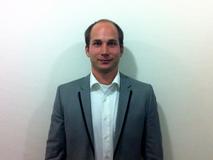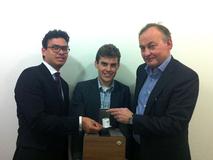SwissLitho and Flatev receive the final kick
08.11.2012
Two Zürich based start-up are the new beneficiaries of the final “kick”, receiving the 130,000 Swiss Francs support. The ETHZ spinoff SwissLitho can produce the smallest nanostructures in the world with its “NanoFrazor” product. The young company Flatev develops a new capsule machine to make fresh tortillas at the push of a button.
 Felix Holzner, SwissLitho
|
 The co-founders of Flatev: CEO Carlos Alberto Ruiz Preciado, CTO Jonas Müller and Louis Frachon (Suply Chain Management)
|
Felix Holzner, co-founder of SwissLitho, is not only the new venture kick winner, he is also holder of a world record listed int the Guinness World Record book with his IBM colleagues: with their innovation, they have already built the smallest Matterhorn and the smallest 3D world map. The technique is so accurate, that a thousand of those maps could fit on a grain of salt. The IBM researchers achieve this unique sculpting technique with a silicon point a million times thinner than an ant, in order to create patterns and structures about ten nanometres in size.
World-class innovation for nanotechnology
The multiple times patented NanoFrazor is highly superior to the rival techniques. Research institutions or future clients, for instance chipmakers and companies from the domain of electronics, life sciences or optics, can this way work faster, cheaper and easier. Furthermore, the unique 3D functions will open new perspectives and applications for the creation of nanoscaled objects. The first commercial application of NanoFrazor should be ready next summer. The new financing capital will be entirely invested in marketing, in order to demonstrate the technique in real time. The NanoFrazor should also receive a trendy design.
Fresh Tortillas in seconds
Get some fresh flat bread in 35 seconds, as easily as one gets an espresso from a capsule: that’s the idea of Mexican born Carlos Ruiz, who developed a fully automatic tortilla machine with his team and CTO Jonas Müller. Other types of flat bread, like Nan or pita, should be created in different flavours with a single finger pressure. The machine scores many points on the “fresh” theme: one can rarely find homemade tortillas at the restaurant, and may lack the time or skills to make them at home. Aside from the traditional flavour and the chic design of the apparatus, a social component can be seen in the background: like in a raclette or a fondue, people sit together to prepare the meal. Finally, a functional prototype will be presented on a market in San Francisco. The management team has already contacts with big supermarkets chains in America and wants to enter the Californian market with the investors’ money before spring 2014.
Turning your business ideas in a business faster
“It’s not only about the starting capital: the know-how and the training during the kickers’ camps have strongly helped us to turn our vision into reality in such a short amount of time. This is why I can strongly recommend venture kick to every young entrepreneur”, says Carlos Alberto Ruiz after his success. Felix Holzner adds: “It is incredible how much the monthly reports which you have to provide during the venture kick process - which initially angered us a little – have eventually helped us. It help building momentum, and without them and the venture kick momentum, we would definitely not be as far as today.
Already more than CHF 9 million start-up capital distributed
Since the launch of venture kick on September 26, 2007, more than 250 project teams have benefited from CHF 9.3 million. It contributed to the creation of more than 1600 newly created jobs and a financing volume of around CHF 300 million. These results show that this approach offers a great return for the Swiss economy and its enterprises. Thanks to venture kick, start-ups learned how to win customers and convince investors more rapidly. Are eligible all young talents with innovative ideas, which have not yet founded their company and are enrolled or employed at a Swiss University: students, postgraduates, researchers and professors.
More about venture kick
The private initiative venture kick is financed by the GEBERT RÜF STIFTUNG, the ERNST GÖHNER foundation, the OPO foundation, the AVINA STIFTUNG, the FONDATION LOMBARD ODIER and Debiopharm Group. The project is managed by the IFJ Institut für Jungunternehmen in St. Gall. The objective of the initiative is to double the amount of startups originating from Swiss universities and technical colleges. Each month, eight projects get the chance to present themselves to a jury. The four most promising receive CHF 10'000 and automatically qualify for the second round held three months later, where the two best teams receive another CHF 20'000. In the third and final round, taking place six months later, the winner is granted CHF 100'000.
World-class innovation for nanotechnology
The multiple times patented NanoFrazor is highly superior to the rival techniques. Research institutions or future clients, for instance chipmakers and companies from the domain of electronics, life sciences or optics, can this way work faster, cheaper and easier. Furthermore, the unique 3D functions will open new perspectives and applications for the creation of nanoscaled objects. The first commercial application of NanoFrazor should be ready next summer. The new financing capital will be entirely invested in marketing, in order to demonstrate the technique in real time. The NanoFrazor should also receive a trendy design.
Fresh Tortillas in seconds
Get some fresh flat bread in 35 seconds, as easily as one gets an espresso from a capsule: that’s the idea of Mexican born Carlos Ruiz, who developed a fully automatic tortilla machine with his team and CTO Jonas Müller. Other types of flat bread, like Nan or pita, should be created in different flavours with a single finger pressure. The machine scores many points on the “fresh” theme: one can rarely find homemade tortillas at the restaurant, and may lack the time or skills to make them at home. Aside from the traditional flavour and the chic design of the apparatus, a social component can be seen in the background: like in a raclette or a fondue, people sit together to prepare the meal. Finally, a functional prototype will be presented on a market in San Francisco. The management team has already contacts with big supermarkets chains in America and wants to enter the Californian market with the investors’ money before spring 2014.
Turning your business ideas in a business faster
“It’s not only about the starting capital: the know-how and the training during the kickers’ camps have strongly helped us to turn our vision into reality in such a short amount of time. This is why I can strongly recommend venture kick to every young entrepreneur”, says Carlos Alberto Ruiz after his success. Felix Holzner adds: “It is incredible how much the monthly reports which you have to provide during the venture kick process - which initially angered us a little – have eventually helped us. It help building momentum, and without them and the venture kick momentum, we would definitely not be as far as today.
Already more than CHF 9 million start-up capital distributed
Since the launch of venture kick on September 26, 2007, more than 250 project teams have benefited from CHF 9.3 million. It contributed to the creation of more than 1600 newly created jobs and a financing volume of around CHF 300 million. These results show that this approach offers a great return for the Swiss economy and its enterprises. Thanks to venture kick, start-ups learned how to win customers and convince investors more rapidly. Are eligible all young talents with innovative ideas, which have not yet founded their company and are enrolled or employed at a Swiss University: students, postgraduates, researchers and professors.
More about venture kick
The private initiative venture kick is financed by the GEBERT RÜF STIFTUNG, the ERNST GÖHNER foundation, the OPO foundation, the AVINA STIFTUNG, the FONDATION LOMBARD ODIER and Debiopharm Group. The project is managed by the IFJ Institut für Jungunternehmen in St. Gall. The objective of the initiative is to double the amount of startups originating from Swiss universities and technical colleges. Each month, eight projects get the chance to present themselves to a jury. The four most promising receive CHF 10'000 and automatically qualify for the second round held three months later, where the two best teams receive another CHF 20'000. In the third and final round, taking place six months later, the winner is granted CHF 100'000.


